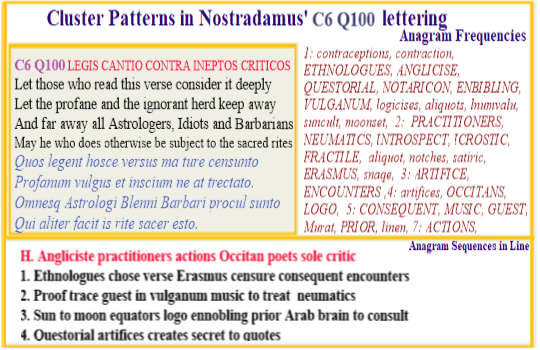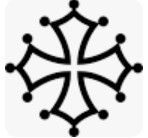 Analyses of all verses
Analyses of all verses
|
 Web Site
Web Site |
 All
Sefirots All
Sefirots |
Nostradamus C6 Q100: The powerful curse of musical code.
Copyright: Allan Webber, December 2015
 Although generally ignored or dismissed as a weird
curse C6 Q100 is the major key to unlocking the code methods Nostradamus
employed when writing his Prophecies.
Although generally ignored or dismissed as a weird
curse C6 Q100 is the major key to unlocking the code methods Nostradamus
employed when writing his Prophecies.
Its unusual tone and the unique nature of the verse were reasons that drew me to it from the beginning of my search for Nostradamus' code.
The verse is the only one that is completely in Latin and it is the only one that has five lines, four of which are in his standard quatrain format with the fifth presented as a header as shown above.
My claims for this verse are based on its internal content which is to be found though the anagrams that are formed by the lettering of the text.
 This content has a richness that lowers the
likelihood that they are all products of chance alone. Alongside is a
picture of the Occitan logo which is referenced in the anagrams of this
verse.
This content has a richness that lowers the
likelihood that they are all products of chance alone. Alongside is a
picture of the Occitan logo which is referenced in the anagrams of this
verse.
Extra Info:
As previously stated this verse took my early interest and it did so because its tone hinted that it held aspects that could eliminate some of the most troublesome attributes of Nostradamus' Prophecies.
If he was a charlatan as many have claimed then there was of course no need for this verse to have any real of meaning at all and it is easy to say that this curse then only affirms that the entire work is nonsense. However if, as Nostradamus claimed, his words would be correctly read five hundred years beyond his time then there had to be a way to access the code.
In order for this to happen there had to be clues about what methods were used as well as the name of the specific sources on which he relied in creating the code.
Without these things it is very difficult to break any code that has successfully remained hiden for a long period of time, let alone five hundred years.
So we have a verse that is unlike all others and is written in Latin and this suggests it provides part of the solution. In the second line of text there are anagrams for proof (o. Pro), music (scium) and neumatics (scium ne at) and these concepts resonate with the idea of a key to the code being held within this quatrain. Neumatics were the sixteenth century means of putting musical sound on paper.
The header is also stronger herald that there is a coding scheme. Its text alone suggests a secret music that is intended for a specifically qualified person for it says Incantation of the Law against inept critics. From its lettering we find anagrams for Angliciste (LEGIS CANTI), Occitans (S CANTIO C), Notaricon (NTIO CONTRA), contractions (S CANTIO CONTR) and Poets (EPTOS) and each of these makes a meaningful contribution to the idea of code within the Prophecies.
As spelt the term Angliciste implies a French person who is expert in English. Such people were not uncommon in the royal houses of 16thC France with Nerac, the court of Marguerite d'Angouleme being one of those places and it was only a few kilometers from Agen where Nostradamus lived in the 1530's. Jules Scaliger who was linked to Nostradamus was a court physician for Nerac during that period and this would have made it possible for both men to meet anglicistes such as Anne Boleyn, John Dee and others.
The term Notarikon refers to a Hebraic coding technique involving letter exchange using a formula based on the position of those letters in a message. In many cases it involved a contraction of the lettering where for instance it used the first letter of each word.
Occitan is a term identifying a region in Southern France that spoke a common language called langue d'Oc. This tongue was that favoured by many poets especially those writing in the romantic musical style of the troubadors of Southern France.
The first line of text says Let those who read this verse consider it deeply and the tone of this is reflected in the anagrams ethnologues chose verse Erasmus censure consequent encounters. Ethnologues is a french word for ethnologist, a person who studies human cultures. This term fits in with references such as Occitans and Angliciste.
Erasmus was a pre-eminent figure in the 16thC and Jules Scaliger of Agen was one of the greatest critics of Erasmus' Latin works. Although Nostradamus, through Julius Scaliger of Agen, had literary contact with Erasmus this man died nearly 20 years before the quatrains were written and published. Yet in the current verse there is one of the two anagrams for Erasmus that are found in Nostradamus' Prophecies.
Erasmus was a classical scholar and wrote in a pure Latin style. Among humanists he enjoyed the sobriquet "Prince of the Humanists", and has been called "the crowning glory of the Christian humanists". Using humanist techniques for working on texts, he prepared important new Latin and Greek editions of the New Testament, which raised questions that would be influential in the Protestant Reformation and Catholic Counter-Reformation.
Erasmus' Latin version of the New Testament fits comfortably into the theme of an important Latin book that Nostradamus used as the basis for his code. This volume was written by Erasmus to correct what he considered to be improper translation of earlier Greek versions. To reduce criticism of his Latin work he published the Greek text on which he had relied however his publication of the Greek version has been heavily quetioned by later commentators.
The evidence is sufficient for us to have a high degree ogf confidence that these particular Erasmus' publications are the source text on which Nostradamus drew for his coding and that the likely passage lies in Erasmus' Greek version of Revelations.
Key Ideas arising from the anagrams:
contraceptions, ethnologues, contraction, astrologiq, angliciste, questorial, notaricon, vulganum, aliquots, logicise, moonset, critic, task, practitioners, introspect, neumatics, icrostic, fractile, aliquot, notches, Copts, satiric, Erasmus, coquetries, encounters, artifice, actifier, casting, Occitans, big, logo, consequent, container, atropine, questor, incites, honest, music, guest, nuns, ceasing, quotes, filter, Proclus, Murat, prior, brain, actions, cease, matures, troop, entreat, stop, poor, poets, gentle, glues, refit, mature, host, then, farce, creates, Caesers, inept, menu, proof, chose, pertain, atop, mast, Croton, Caf.